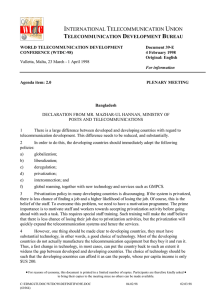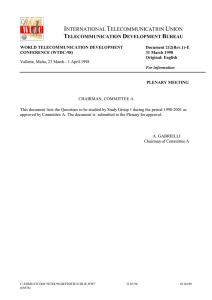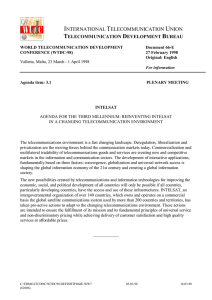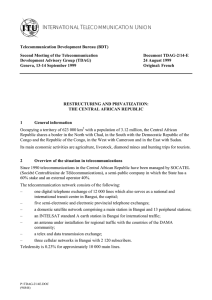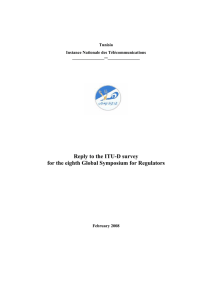I T U D
advertisement
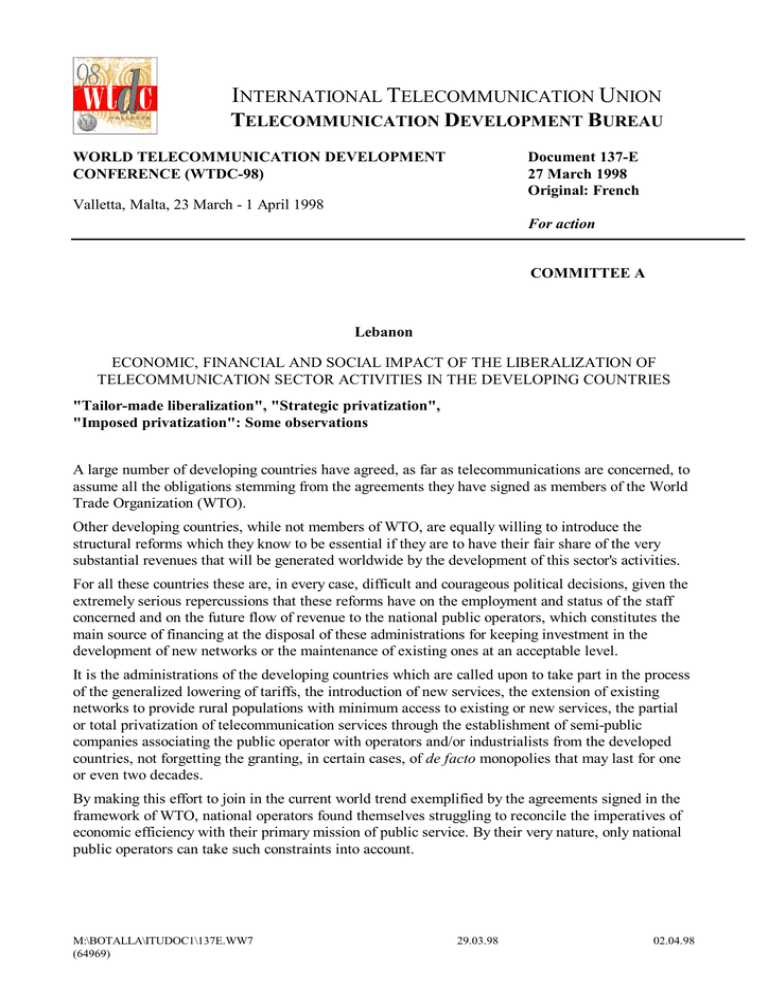
I NTERNATIONAL TELECOMMUNICATION UNION TELECOMMUNICATION DEVELOPMENT BUREAU Document 137-E 27 March 1998 Original: French WORLD TELECOMMUNICATION DEVELOPMENT CONFERENCE (WTDC-98) Valletta, Malta, 23 March - 1 April 1998 For action COMMITTEE A Lebanon ECONOMIC, FINANCIAL AND SOCIAL IMPACT OF THE LIBERALIZATION OF TELECOMMUNICATION SECTOR ACTIVITIES IN THE DEVELOPING COUNTRIES "Tailor-made liberalization", "Strategic privatization", "Imposed privatization": Some observations A large number of developing countries have agreed, as far as telecommunications are concerned, to assume all the obligations stemming from the agreements they have signed as members of the World Trade Organization (WTO). Other developing countries, while not members of WTO, are equally willing to introduce the structural reforms which they know to be essential if they are to have their fair share of the very substantial revenues that will be generated worldwide by the development of this sector's activities. For all these countries these are, in every case, difficult and courageous political decisions, given the extremely serious repercussions that these reforms have on the employment and status of the staff concerned and on the future flow of revenue to the national public operators, which constitutes the main source of financing at the disposal of these administrations for keeping investment in the development of new networks or the maintenance of existing ones at an acceptable level. It is the administrations of the developing countries which are called upon to take part in the process of the generalized lowering of tariffs, the introduction of new services, the extension of existing networks to provide rural populations with minimum access to existing or new services, the partial or total privatization of telecommunication services through the establishment of semi-public companies associating the public operator with operators and/or industrialists from the developed countries, not forgetting the granting, in certain cases, of de facto monopolies that may last for one or even two decades. By making this effort to join in the current world trend exemplified by the agreements signed in the framework of WTO, national operators found themselves struggling to reconcile the imperatives of economic efficiency with their primary mission of public service. By their very nature, only national public operators can take such constraints into account. M:\BOTALLA\ITUDOC1\137E.WW7 (64969) 29.03.98 02.04.98 -2CMDT98/137-E In some countries, these efforts of adjustment or reform were carried out so expeditiously that the privatization of telecommunications has already taken place whereas in certain major European countries its introduction is meeting with very strong resistance and will only come about as a result of the building of Europe and the legal obligations that this imposes on signatory States. In other words, some developing countries are being asked to carry out in a few years (from 5 to 10) what countries at the leading edge of development took 50 years to achieve, and which certain European countries have still not achieved, and this with extremely limited financial resources. These efforts had to be accomplished without giving the general public the feeling that they were being sacrificed to market forces and would only be allowed access to those services which were within their purchasing power. It was also necessary to take into account the social and cultural peculiarities of the general public, and in particular their perception of the role of the State and the citizen. While it is true that the success of national public operators in this process has been uneven, for many of them it is indisputable. Impressive results have been achieved in national coverage, lower tariffs and the modernization of networks by several developing countries, including Lebanon, Saudi Arabia, Qatar, the United Arab Emirates, Senegal, South Africa, Colombia, Mexico, Viet Nam and many others. The marginal growth rate of national coverage in the fixed and mobile telephone services is much higher in many developing countries than it is in most developed countries. This very high growth has not entailed a loss of efficiency in marketing, customer service, financial management or technical maintenance. Indeed, the opposite is true. Nor have these administrations evinced less understanding of what their role should be in forums and international conferences, including those held under the auspices of ITU. The fact is that in all developing countries where the political authorities have supported the restructuring of telecommunications under the guidance of the national public operator without specific constraints, the latter have successfully completed the modernization process, even when it implied privatization, in other words a lessening or even disappearance of their own prerogatives. The failure of certain national public operators in this area is explained in almost all cases by a difficult situation to start with or by the artificial political obstacles that stood in their way. In the case of the privatization of national public operators in the telecommunication sector in developing countries it is important to draw a distinction between "strategic privatization" and "imposed privatization". The first form of privatization has the effect of strengthening the financial capacity and flexibility of a national public operator whose situation is already satisfactory. In many developing countries this is in fact the case. Privatization of this kind facilitates agreements and alliances with worldwide operators. It leads to greater transparency in the management of financial and human resources since the State no longer plays the part of the all-powerful shareholder whose decisions have to be approved whatever form they take. Nevertheless, these strategic privatizations have to be carried out with all necessary caution and at a suitable pace. This is what is happening in Europe with France Telecom or Swisscom and nobody in these countries would dream of regarding the pace at which the privatization of the public operator is proceeding as a sign of inefficiency or unwillingness on the part of the operator concerned. M:\BOTALLA\ITUDOC1\137E.WW7 (64969) 29.03.98 02.04.98 -3CMDT98/137-E Lebanon would like to point out that, generally speaking, the prerequisites for the successful introduction of a reform that affects the daily life of the entire population include consideration of the attitude of the general public towards this reform and the way in which they understand it. It is therefore for the administration concerned to decide to undertake this privatization, and for the national public operator to carry it out with the support of its administration, taking care to set the highest possible value on the company's assets and to offer the staff whose task it will be to develop the company the opportunity to buy shares in the new entity. Privatization of the second kind occurs when the financial and management situation of the public operator is already seriously eroded. In this event, privatization is adopted as "the lesser of two evils" and can therefore be regarded as being "imposed" by circumstances. Fortunately, there are not many developing countries in which this state of affairs prevails. Curiously enough, the idea that is uppermost in the minds of people in the developed countries, international forums and management consultant agencies is that telecommunications in the developing countries are of this second type, which is not the case. Accordingly, public operators in the developing countries cannot reasonably be accused of a presumed inability to renovate telecommunications in their countries or denied the right to continue to perform the task that is theirs. The tirelessly repeated admonitions that telecommunications in these countries should be fully privatized are based on ideological dogma and often conceal ulterior motives of a mercantile nature. No administration of whatever kind would dream of denying the progressive and profitable nature of the liberalization of telecommunications throughout the world. Nor does any administration wish to be left behind when it comes to introducing national structural reforms. To ensure that these reforms are successful, Lebanon would like to suggest a methodology which has the merit of being applicable to almost all the situations that occur in the developing countries. Proposals and recommendations The methodology to be adopted for the liberalization of telecommunication activities in the developing countries involves transition through certain intermediary stages before reaching the final objective. These stages are indicated in the diagram in Annex 1 to this document, which takes into account, as will be seen, the essential concerns expressed by most administrations in the developing countries: • The liberalization of telecommunication services is recommended because it stimulates economic growth and is essential for the socio-economic integration of the various sections of the population. • The means of carrying out this liberalization (whether by partnership or privatization) and the establishment of a timeframe for its completion are the exclusive preserve of the political authorities of the country concerned, whether or not it has signed international trade liberalization agreements (such as those of WTO for example). • The decision to introduce the reforms required for liberalization should not be taken until serious studies have been made to determine the most effective means applicable to each particular case, and to evaluate the different impacts these reforms might have on the population, employment, revenues, etc. These studies should be carried out with financing M:\BOTALLA\ITUDOC1\137E.WW7 (64969) 29.03.98 02.04.98 -4CMDT98/137-E that is worked out with the agreement and participation of the public operator in the country concerned in order to avoid reaching the wrong conclusions or taking decisions that would ultimately be harmful. Lebanon invites the Conference to give full consideration to the above-mentioned points. Specific decisions should be taken at the end of the Conference to: • Adopt a new definition that would more appropriately qualify the nature of a "national operator, incorporating in this designation all operators who, in a single country, carry out equivalent tasks, without needing to specify whether their capital is held by the private sector or by the State. • Recognize that investments in telecommunications made in the developing countries in the form of partnership contracts with private operators cannot be governed by legal provisions that are excessively binding and applicable, moreover, worldwide. • Recognize that a plethora of legal provisions is likely to be a lasting impediment to the development of such partnerships or even a threat to their very existence. • Avoid, as far as possible, laying down comprehensive rules for "liberalization" or "privatization". • Promote concrete incentive measures to attract local, regional or international capital towards telecommunication projects that might be carried out in developing countries, in particular by maintaining the prerogative of all States to use fiscal means to encourage movements of capital and the conclusion of partnership contracts on its national market, with complete freedom to determine conditions and modalities. • Take steps to strengthen the capitalization of national operators in the developing countries, who are usually unable to rely on the financial market to channel public savings into the shares of national operators. Such strengthening can only be carried out with equity capital and must therefore be based on the introduction of a tariff policy that favours the extension of existing networks, the provision of new services and the introduction of charges guaranteeing the public service mission. • Adopt rules that would make it possible to distinguish between new programmes which result in the sharing of revenues from the operation of the systems concerned and those which seek to avoid such sharing, leaving it to each administration to determine the special conditions that would enable it to give priority to the former over the latter. Lebanon, which has attempted here to put forward some responses to the concerns expressed by a very large number of administrations in the developing countries, recommends that WTDC-98 adopt the principles and methodology outlined in this document. • Telecommunication development is taking place within the context of a general trend towards globalization of the economy and liberalization of trade, particularly in goods and services. • Various studies carried out in countries displaying different economic characteristics show indisputably that the telecommunication sector, through the criteria it has adopted, reflects a country's level of development more than any other. • Worldwide liberalization of telecommunication activities can result in a further widening of the prevailing economic gap between the rich and poor countries, something which must be avoided at all costs. M:\BOTALLA\ITUDOC1\137E.WW7 (64969) 29.03.98 02.04.98 -5CMDT98/137-E • Liberalization is even liable to introduce a new type of discrimination between rich and poor countries, specific to telecommunications, between the "information rich" and the "information poor". • By actively supporting their telecommunication activities, developing countries stand a chance of creating considerable direct wealth, speeding up social and cultural integration of their populations, and boosting growth in all sectors of their economies. • This specific feature of telecommunications stems from the all-pervading use to which they are put, which means that communication services become tools of civilization rather than a mere commodity, and hinges on the role played by ITU and its various components, including BDT. • In all countries, and hence in particular in the developing countries, there is a need to undertake immediate structural reforms and adjust legislation so as to pave the way for the liberalization of telecommunication activities, and gradually eliminate the many and varied constraints which these activities come up against. • With this in mind, what has come to be known as "privatization" is a means rather than a end. • All possible measures should be taken to encourage private sector participation in telecommunication activities, since this will benefit the State in terms of both wealth creation and sound management of financial and human resources. In today's world, it is not the role of the State to engage in direct trade through the sale of hardware or services, apart from administrative services, or to grant staff in companies grappling with international competition a special status which would be a costly burden on the State's finances. • It is thus up to each administration, in line with its own wishes and taking account of its own situation, to choose the most appropriate and efficient ways of achieving effective "liberalization" of telecommunication activities in its country, it being understood that prior and large-scale privatization of the sector is not an essential prerequisite for achieving this. • "Privatization" must not be prompted by international pressure, nor lead to a depreciation of State-owned companies' assets. It can only be contemplated on a case-by-case basis. • Quite frequently, in developed and developing countries alike, the national operator, albeit State-owned, has effectively done a very good job. • The most successful examples of liberalization in both developed and developing countries have involved "tailor-made" liberalization of telecommunication activities, where the national public operator takes account of the specific features of the country. • It is thus unacceptable to maintain that "liberalization" will only work if it is accompanied by privatization of the national public operator. • Optimum participation of the private sector in telecommunication activities must not mean the abandonment of public service missions, which are a matter in respect of which the private sector has no duty, desire or interest. • Each administration, apart from participating in international forums and meetings, must make a determined commitment to communication and ensure that its strategic decisions in telecommunications are as transparent as possible. • Each administration must retain the right to decide which new programmes may be allowed in its national market and under what conditions. M:\BOTALLA\ITUDOC1\137E.WW7 (64969) 29.03.98 02.04.98 -6CMDT98/137-E • Each administration has the right to promote, by any means it deems appropriate, including a suitable fiscal policy, the programmes which it considers will enable it to generate more income. • The key mission of the administration in telecommunications is to guarantee that all of the population has at least some access to services, to ensure that technical and tariff standards are respected in order to guarantee in practice lower access costs and competition, to promote research, training and integration, and to provide efficient supervision of regulatory activities. • BDT must provide developing country administrations with all the necessary logistical and financial aid and expertise to enable each country to move effectively towards achieving the objective of liberalizing telecommunication activities. • More large-scale use must be made of evaluation and study missions and consultancy reports for the developing countries. • Private global operators must make a financial contribution, in all the developing countries and in those countries alone, to help achieve an effective transition to full liberalization of telecommunications in the developing countries, by contributing to the establishment of a private fund for telecommunication development (PFTD), managed under the control of BDT and under the legal authority of ITU. • To avoid any discrimination in this respect, BDT should carry out an official census of such operators, and call upon them to subscribe to the PFTD on a special account opened to receive the amounts in question. • BDT will draw up a regular official report on the status of subscriptions to the PFTD. • BDT will set up a special board to allocate the funds in question to developing country administrations which make a genuine and resolute commitment to liberalizing their telecommunication activities. • Any global operator that refuses to subscribe to the fund could be subject to sanctions, for instance notification of the suspension of its participation in ITU and closure of developing country markets to all the companies or subsidiaries in its group. • The establishment of this fund is one of the measures that may be implemented to ensure in practice that global private operators participate financially in the development of a market of which they will be the main beneficiaries. Lebanon wishes to see these fundamental issues examined very closely by the Conference, and therefore requests that a specific committee or subcommittee be set up to address issues relating to the economic and financial impact of liberalization and development of the telecommunication sector. The committee or subcommittee would investigate new tariff policies and strategies for opening up new markets, and the implications of those policies and strategies, aiming to identify the most effective solutions. It will also consider mechanisms for financing telecommunication projects in the developing countries, and particularly those which will emerge with the advent of new technologies for mobile telephony (GMPCS with Globalstar, Iridium, ICO, etc.), broadband systems (Teledesic, Skybridge, Celestri) and rural telephony. M:\BOTALLA\ITUDOC1\137E.WW7 (64969) 29.03.98 02.04.98 -7CMDT98/137-E It will focus in particular on projects for partnerships between developing country operators, whether private or public, and global or regional operators, studying ways of securing tangible participation of international, financial and regulatory agencies in the preparation and implementation of such projects, and the inputs required from the developed countries to ensure that the process is completed smoothly. It would be desirable if, as a result of the work of the committee or subcommittee, the Conference could adopt one or more resolutions reflecting the concerns set out above, which are shared by the vast majority of developing country administrations in attendance at WTDC-98. M:\BOTALLA\ITUDOC1\137E.WW7 (64969) 29.03.98 02.04.98 -8CMDT98/137-E ANNEX 1 Stages of the liberalization process M:\BOTALLA\ITUDOC1\137E.WW7 (64969) 29.03.98 02.04.98 -9CMDT98/137-E ANNEX 1 Government administration __________ Monopoly Greater autonomy __________ State-owned company run according to private sector rules Need for a national regulator Introduction of the private sector in niche markets Autonomous and independent regulator Private or semi-private operator(s) ___________ Competition Capitalization and valuation M:\BOTALLA\ITUDOC1\137E.WW7 (64969) 29.03.98 02.04.98 - 10 CMDT98/137-E Stages of the liberalization process M:\BOTALLA\ITUDOC1\137E.WW7 (64969) 29.03.98 02.04.98
